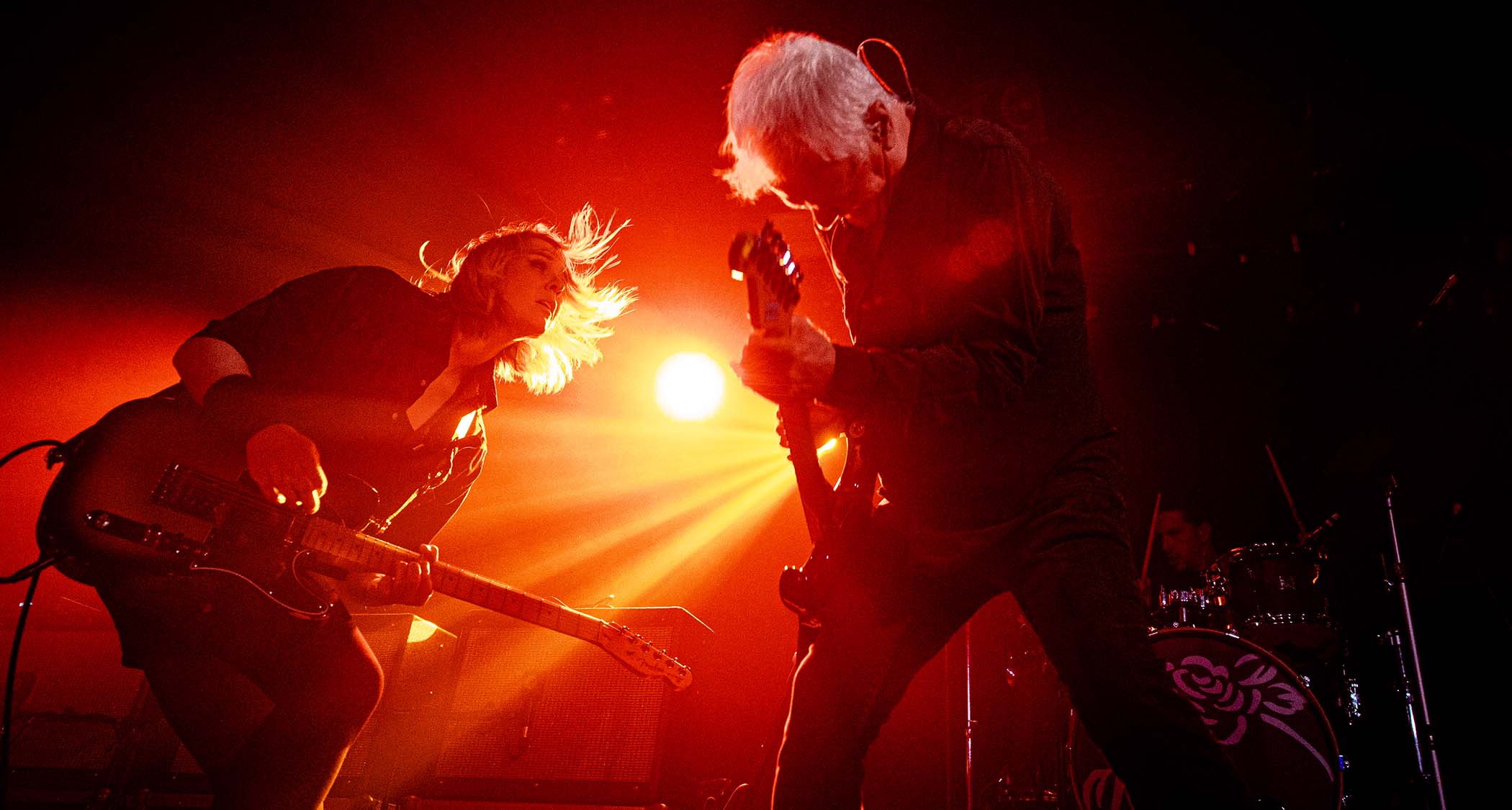Marty Stuart Talks 'Way Out West,' Clarence White and Life Lessons from Johnny Cash
All the latest guitar news, interviews, lessons, reviews, deals and more, direct to your inbox!
You are now subscribed
Your newsletter sign-up was successful
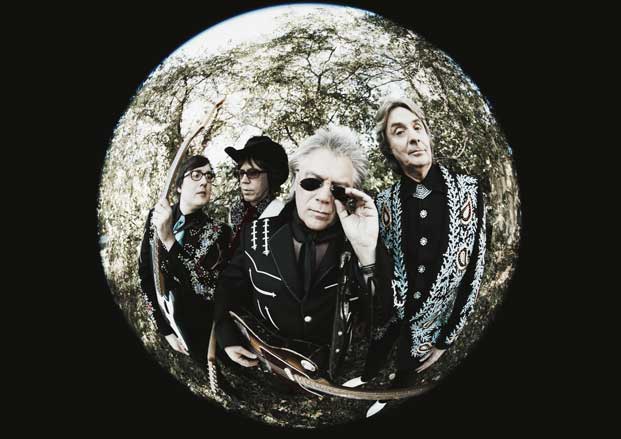
Ace guitarist and longtime Grand Ole Opry member Marty Stuart is one of country music history’s biggest champions, but what Guitar World readers really want to know is…
Your new album, Way Out West, was recorded in California and has a definite “desert” feel. Were the songs already written when you started recording, or were you inspired by your surroundings? —Kurt Balmer
It was recorded at [Tom Petty and the Heartbreakers guitarist] Mike Campbell’s studio and Capitol Studios in Hollywood, and it was absolutely inspired by that part of the world.
I consider Way Out West my love letter to the American West; so many of the things that inspired me came from there.
The first two records I bought were a Flatt & Scruggs record and a Johnny Cash record. The Johnny Cash record had a song called “Don’t Take Your Guns to Town,” and it transported me from my little bedroom in Mississippi to the West, and my imagination ran wild. That’s what started my love for the West.
Growing up in the Sixties, whether it was the Batmobile or the costumes Porter Wagoner wore or the music that came from there, California was the home of what a friend of mine calls “custom culture.” It seemed like the promised land.
The first time I went there was 1974, and I fell in love with it. I wanted to write songs that spoke to that place and everything out there that had inspired me. It all begins with a song—that’s the old saying. [Way Out West] began with a song called “Old Mexico.”
You were in Johnny Cash’s band in the early Eighties, when the charts and critics had turned their backs on the “old-timers.” Was it a struggle in any way? —Doug Sandrine
In a sense. Right after I went to work for him, within about two shows, I realized I wasn’t working with the same mindset that gave us At Folsom Prison, At San Quentin or Bitter Tears. I thought, man, I’m involved with a family show; it’s almost like a Lawrence Welk atmosphere. He was a pop star, a blazing pop star, and I knew he wasn’t satisfied being a has-been on the Middle American fairground circuit.
All the latest guitar news, interviews, lessons, reviews, deals and more, direct to your inbox!
But he was always leaning forward. He was making records with Elvis Costello, Nick Lowe and Rodney Crowell. He was trying, but nobody cared. Nobody cared! That was the struggle. It didn’t matter what he did; it was just thrown to the side.
But when the Rick Rubin thing came around [Rubin produced American Recordings, Cash’s comeback album, in 1994], it was one of those “I told you so” moments. I knew it was gonna happen again. There’s a song that says, “Nashville is rough on the living, but she really speaks well of the dead.” Now that he’s a saint, I think what everybody understands is that at any point in his career, there’s something to study upon, something to be entertained by.
How did you discover Clarence White and his music? After all, you own his vintage Fender Telecaster. —Claude Aubert
His brother, Roland White, is responsible for my whole career, basically. I befriended Roland on the bluegrass festival circuit when I was 12. He was very kind to me; he gave me his autograph and his mandolin pick, and he showed me some stuff on the mandolin and gave me one of the scarves from one of the costumes he wore with Lester Flatt’s band.
He simply made a comment one day: “Give me a call someday and I’ll see if Lester will let you ride along on the bus with us if your mom and dad agree.” I put his number in my billfold and I kept it there. When the time came, I used it, and Roland was true to his word. He invited me to Nashville, and Lester Flatt heard me play, and he offered me a job when I was 13. Until my mom and dad could get to Nashville, I lived at Roland’s house. The White family was my family.
I found out about Clarence from Roland’s record collection. He had an incredible record collection, and I knew [Clarence and Roland] had had a band called the Kentucky Colonels, but there was this big stack of Byrds records. I said, “Are you really into the Byrds?” He said, “Well, my brother plays guitar with them.” And that’s how I found Clarence.
You grew up in the world of bluegrass, gospel and country, but you also dug the Byrds and own Clarence’s Tele. In 1968, despite releasing a country album, the Byrds were seen as outsiders by the Nashville establishment. Do you think they’ve since come to be accepted as a legitimate part of country music history? —Butch Wyatt
I think it’s undeniable. When you listen to contemporary country on the radio, you can almost trace it all back to the Byrds' Sweetheart of the Rodeo.
In 1973, when I was in Lester Flatt’s band, we played this college showcase in Cincinnati. That was when universities all over America came to watch bands play; it was almost like you auditioned. When we played, it was Lester Flatt, Chick Corea and Kool & the Gang. I thought, God, they’re gonna laugh us off the stage. But they didn’t. We encored nine times that night.
The next day, our booking agent booked Lester on 74 college campuses—all from that one 45-minute set. One of the first shows we played was at Michigan State University, and the opening act was Gram Parsons and Emmylou Harris, then Lester Flatt played, then the Eagles played, because they were out touring Desperado. I had just been listening to Sweetheart of the Rodeo at Roland’s house, and that night [in 1973], it all came to life for me. I saw honky-tonk and folk and bluegrass and gospel and rock and roll collide very successfully. I thought, Man, that’s the way to live a musical life, right there.
Mike Campbell and Marty Stuart in the studio (Photo: Reid Long/provided)
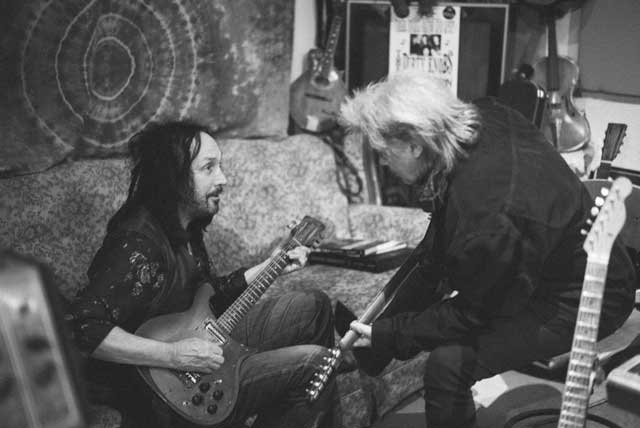
You and Mike Campbell are big-time guitar collectors. Did any of his famous axes wind up on Way Out West? —Brian Cancemi
Mike’s home studio is like guitar heaven. When guitars die, they don’t go to heaven or hell. They go to Mike Campbell’s house. There were guitars, guitars, guitars, guitars. I think we went in there with an incredible array of guitars—there was a sitar and a 12-string that Mike had played on a lot of Tom Petty’s hits. The 12-string is on a song called “Time Don’t Wait.” So there were a couple of guest guitars courtesy of Mr. Mike Campbell.
What pure rock and roll bands, if any, did you listen to when you were growing up? —Sylvester Marcus
I loved the Rolling Stones. I heard a little bit of country music creeping around the edges of some of their songs. Being a Mississippi kid, I could feel they had done their homework, even when I was a little boy. I could feel the Delta blues influence in a lot of their work. I just thought the Stones were the most rag-tag wonderful rock and roll band ever.
What advice do you have for unsolicited songwriters? —Sarah Mayall
Follow your heart. Whatever frightens you the most, or whatever you think is the worst idea, go for it and deal with it. We don’t need anything else out there that’s already been said or sung, and we don’t need sound-alikes. We need fresh perspectives. We need a new Hank Williams, a new Jimmy Webb. We need new writers, a new Tom Petty. We need people that write what they feel and what they see—things that are relevant. Follow your heart at any cost.
What’s the most important lesson you learned from Johnny Cash? —Michel Ney
What I really took away from him more than anything else—and Way Out West is another example of that—is that he was the most fiercely creative human being I’ve ever worked with. If he believed in something—a song or a concept—if nobody came to applaud him or to buy it or see it, that didn’t diminish his interest in it whatsoever. If he believed in something, he did it and he stood by it. That’s the way to live, creatively. I’ve drawn from that experience a lot.
There were times and moments me and my band [the Fabulous Superlatives] were in uncharted territory where nobody cared, and I knew we were the lone rangers out there. But I knew it was the thing to do, and I was convinced of that. It got lonesome sometimes, but I stood by it. You own an impressive collection of historic musical instruments and artifacts.
Can you tell me about your fairly recent shows with the Byrds' Roger McGuinn? I think it's so cool that he performed with Clarence White back in the day—and now with you—and you and Clarence were/are playing the same exact guitar! —Neil Stem
Roger came to do my TV show. Me and my whole band, we just wanted to follow him to the parking lot. The next day I called my booking agent and said, Can you please book us some shows with Roger McGuinn? Roger agreed to it, and we went out and did a run. We couldn’t wait to finish singing what we had to sing to get Roger started, because it gave us a chance to do the Byrds.
And you’re right, man. To hear that pull-string, Roger’s Rickenbacker and the sound of Roger’s voice, all together on one stage, and playing the true arrangements, I felt like I was 15 years old, on top of the world with rockets underneath me. It was awesome.
To speak about what happened in Nashville, the way the Byrds were disrespected in 1968, I have to tell you there’s a happy ending to the story. The first time I met Roger, I was up in Pennsylvania at a concert. I basically walked up to him and apologized to him about how his band was treated in Nashville. He said, "Oh man, you know, that’s water under the bridge." I said, Give us another shot. I invited him to sit in with me and my band at the Grand Ole Opry when we played there again, and Roger graciously came.
I can tell you that from the moment he walked into that building that Saturday night, the stage hands, the executives at the Grand Ole Opry, the musicians, he got two standing ovations and encores, so things did get righted a little bit. I think Sweetheart of the Rodeo is probably one of the most vital and important records to unlocking the blue-sky creativity that has since occurred.
Which of your guitars has the most mojo and why? —Lennie Pike
I’d say Pops Staples’ rosewood Telecaster, the one he played in The Last Waltz. Mavis and Yvonne Staples, Pops’ daughters, gave me that guitar. I’m telling you, that is a gospel instrument of light. It’s an Excalibur guitar. It has probably the best mojo you could ever ask for.
Do you still buy guitars all the time? —Mack Rice
When people start telling me about guitars, I stick my fingers in my ears and go, “La, la, la, la, la.” [laughs] I try really hard to not buy guitars. I sold a lot of them last year just to thin it down, and I got it down to the collectible pile and the working pile. But as you know, every now and then one comes along that grabs your heart. I think the last guitar I bought was a collectible Martin for the archives. I had to have it.
The Clarence White Tele is equipped with Gene Parsons’ original StringBender. Does that make it extra heavy? —Marta Maciel
It’s about like playing a banjo. These days, when I pick up a regular Telecaster, it feels too light.
Did you have a B-bender before you got Clarence’s guitar? —Damien Linotte
I did. When I would listen to those Byrds records at Roland’s house, and Roland told me what the concept was, I bought a Telecaster, I think about 1974, and I took it to Shot Jackson. He had never heard of Clarence. I had him install a string-bender in my Tele and make it a little thicker. He didn’t know why I was doing such a thing. I would stand in front of my speakers and try to play lick for lick for lick what Clarence was doing. I got so far with it. Then I realized I can’t get my guitar to sound that way.
But after I picked up Clarence’s guitar and really started understanding the sound of it and how it works, I realized there’s only one guitar in the world that sounds that way. I was in the zone, but Clarence’s guitar, that’s a whole other matter.
What’s your most prized musical possession?—Barbara Pepper
The Clarence guitar. I think I’d be a bit lost without that guitar after all this time.
There’s a weird little toggle switch on the control plate of the Clarence White Tele. What does it do? —Damien Linotte
That was on there when I got it. It throws the front pickup out of phase. If you listen to “Tulsa County” from the Byrds’ Ballad ofEasy Rider album [1969], that’s the sound right there. There’s a Merle Haggard song called “Branded Man,” and I think James Burton played guitar on it. The “Branded Man” guitar solo has that effect. Clarence was probably inspired by that solo.
You play a lot of different instruments. Which is most challenging or difficult? —James Flavin
All of them! I don’t know how it got around that I play a lot of instruments. I really don’t. I play the guitar and the mandolin. It’s a challenge every night, and some nights are better than others.
What do you hope your legacy will be when you’re gone—beyond the music? —Sharon Celani
I don’t know; it’s a work in progress. There’s a museum trail in Mississippi. The spiritual home, in my opinion, is in Tupelo, with the birthplace of Elvis Presley. And there’s the wonderful B.B. King Museum [in Indianola] and the Grammy Museum in Cleveland, Mississippi.
But in my hometown of Philadelphia, Mississippi, there’s gonna be a place called Marty Stuart’s Congress of Country Music. It’s where my collection and archives will live. It’ll be a center for young people to come and study upon, and there’ll be a live performance space. Perhaps that’ll be a good place to rest the legacy. Also, I guess I was a musical warrior who fought for what he believed in and then passed it on to everybody else when he was done.
Marty Stuart with the Clarence White Telecaster (Photo: Alysse Gafkjen)
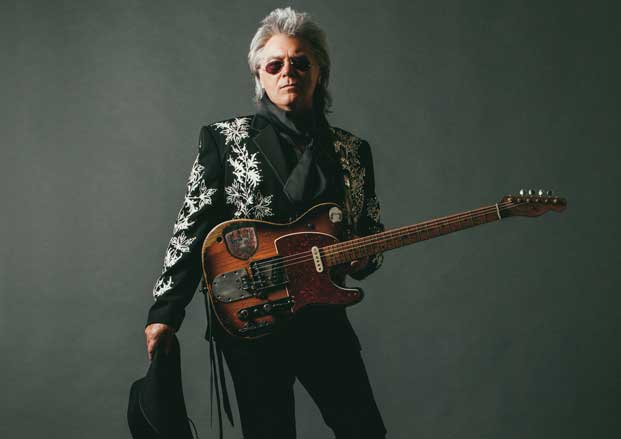
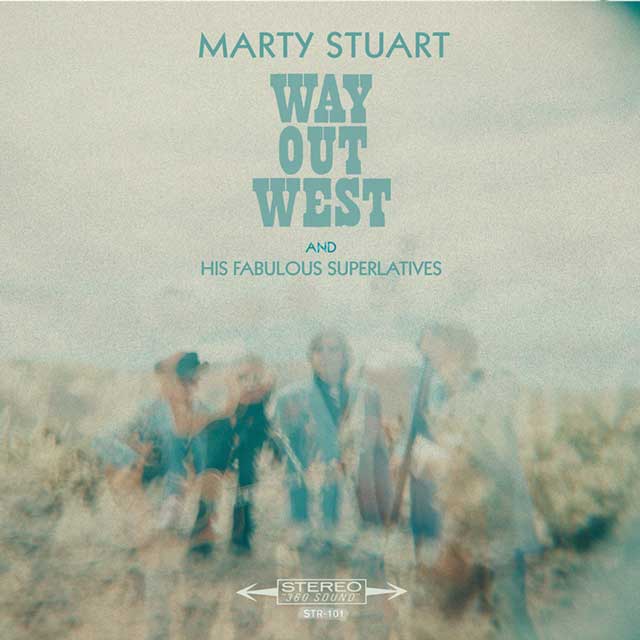

Damian is Editor-in-Chief of Guitar World magazine. In past lives, he was GW’s managing editor and online managing editor. He's written liner notes for major-label releases, including Stevie Ray Vaughan's 'The Complete Epic Recordings Collection' (Sony Legacy) and has interviewed everyone from Yngwie Malmsteen to Kevin Bacon (with a few memorable Eric Clapton chats thrown into the mix). Damian, a former member of Brooklyn's The Gas House Gorillas, was the sole guitarist in Mister Neutron, a trio that toured the U.S. and released three albums. He now plays in two NYC-area bands.
